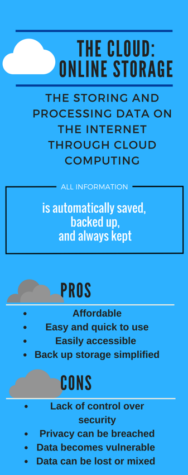Is Cloud Storage Safe?
April 19, 2017
Thousands upon thousands of gigabytes of data are stored every day on the “Cloud.”
Basically, the “Cloud” is a metaphor for the internet. It is a place for a person’s data to be stored. Cloud computing, however, is the actual method for data storage. It is the storing and accessing of data and programs through the Internet instead of on a computer’s hard drive. Meaning all information that is stored and accessed, is stored and accessed online.
The “Cloud”, however, is not a person’s hard drive. That would be called local storage or computing according to PC Mag. When a person stores all their data and running programs on a hard drive, the information can only be accessed from that particular hard drive or local network. Any devices connected to that network can access the information, but for the average person, if they aren’t connected to the network, they can’t access their information.

The “Cloud” helps to reduce space typical hardware storage would take up and also limit the cost of repairing those items. By outsourcing a lot of the data stored on hardware and software to an outside IT specialist, the cost, management, and space needed decreases according to BBC.
There are several applications that act through “Cloud” like storage. One of the most popular examples is Google Drive. All of its storage is found online and can be linked to other Google apps like docs, slides, spreadsheet, etc.
Gmail, google calendar, google maps, and all other Google apps are considered to be “Cloud” apps because they store all data online.
On top of that, all information is automatically saved, backed up, and always kept.
There are a variety of advantages that come from storing information on the “Cloud” including increased speed and unlimited space according to RC Wireless. Through using the “Cloud” all data and IT resources are only a click away. Instead of sitting on a set limit of space someone can use for storage, they can use as much or as little storage as needed.
As for speed, “Cloud” storage allows for information to be accessed in virtually no time at all and from almost anywhere in the world. So long as a person has internet access and a device, they can access their stored data.
However, many debate whether or not storing information online is secure. The issue, according to BBC, is that when someone hands over their data, they hand over total control of their data as well. Data could be lost, stolen, corrupted, or mixed up with someone else’s data once handed over.
Also, since the “Cloud” is internet based, access is dependent on internet connection. And like a computer’s hard drive, the “Cloud” can fail at any time for any reason, says RC Wireless. In terms of security, providers are responsible for the management and safeguarding of the “Clouds” infrastructure, but basic access is the user’s responsibility. And, according to RC Wireless, security is never guaranteed.
Cloud computing also leaves data vulnerable, as nothing on the internet is completely secure. Even the most secure networks experience hackings and breachings. Take Yahoo, for instance.
On Wednesday, March 8th 2017, the U.S. Justice Department charged two Russian intelligence officers for leading a criminal hacking that gained access and control of over 500 million Yahoo accounts in 2014 according to The New York Times. The information was used to spy on Russian government officials as well as business executives.
From being hacked in 2014 to being threatened in 2017, the “Cloud” is not the most secure network. However, there are pros and cons to it. In terms of storing basic, localized data like calendars or word documents it should be safe. If someone is planning on storing personal, confidential information, they may want a more secure option.







